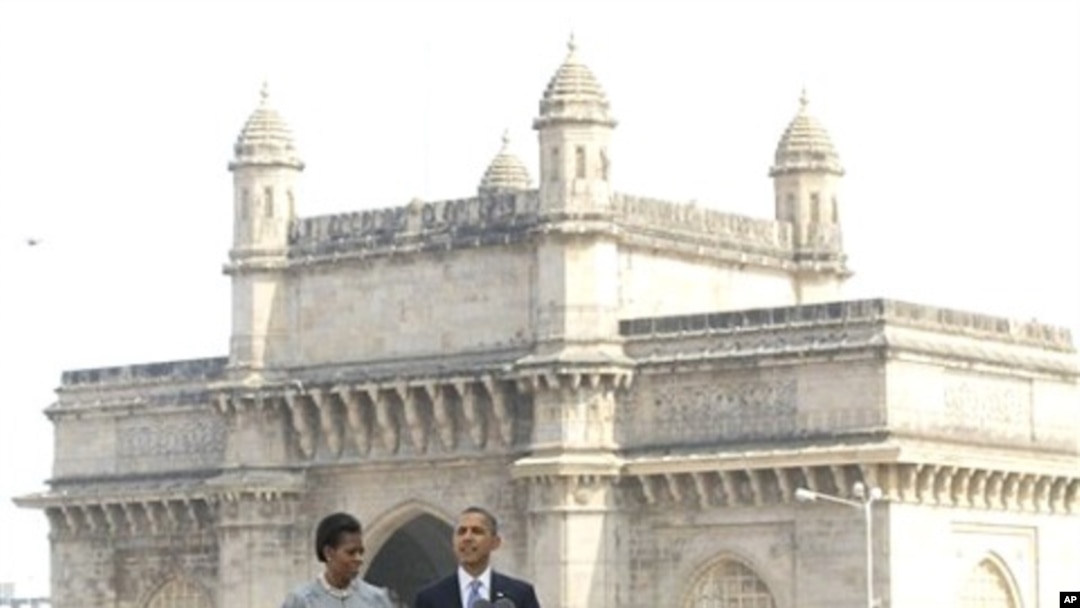President Obama is in Mumbai, India's commercial capital, at the start of a three-day visit to elevate U.S.-India economic relations. Before diving into business and economic issues, the president paid tribute to victims of the 2008 terrorist attacks in Mumbai.
The president and his wife, Michelle, stepped off Air Force One after it landed in Mumbai and were greeted by U.S. Ambassador to India Timothy Roemer and the co-chairman of the president's export council, Jim McNerney.
Mr. Obama and the first lady then boarded a presidential Marine helicopter for the short trip to a landing zone near the Taj Hotel in Mumbai.
At the hotel, Mr. Obama viewed a marble memorial to victims of the November 26, 2008 terrorist attacks that killed 166 people, and signed a guest book at the site.
On the roof of the hotel, overlooking the historic Gateway of India, the president said the Taj and those who died there became the symbol of the strength and resilience of the Indian people. Mr. Obama said his visit should send a clear message.
"We visit here to send a very clear message, that in our determination to give our people a future of security and prosperity, the United States and India stand united," he said.
Mr. Obama drew a comparison between the November 26, 2008 attacks in Mumbai, and the September 11, 2001 terrorist attacks on the United States. Those who attacked innocent people in Mumbai, he said, failed in their mission.
"The perpetrators wanted to pit believers of different faiths against one another, but they failed, because here in Mumbai, the diversity that is India's strength was on full display," he said. "Hindus, Sikhs, Christians, Jews and Muslims, protecting each other, saving each other, living the common truth of all the world's great religions - that we are all children of God."
Mr. Obama later turns his attention to the main focus of his stop in Mumbai, enhancing U.S.-India economic and business ties, with the associated objective of growing more jobs in the United States.
He will meet with Indian business entrepreneurs and take part in a roundtable discussion with U.S. chief executives gathered here, and then make remarks to a business summit organized by the U.S.-India Business Council.
In remarks to media on Saturday, a group of U.S. executives said they hope the president's visit will further open the Indian market to American businesses.
Indra Nooyi, the chairman and CEO of PepsiCola, was among those responding to reporters asking exactly how increasing U.S. investment in India can lead to more jobs in the United States.
"So countries like India, China, all of the emerging economies, we have to invest in it to get the top line growth, and once we get the top line growth we can then re-invest in the United States in new sectors," said Nooyi.
Dave Cote, chairman and CEO of Honeywell, said, "We tend to look at this as a zero-sum game, that if we are growing here [in India] that means that something is not happening there. That's not the case. Economics is not a zero-sum game. So we end up growing everywhere and as you grow everywhere you start to add jobs."
India is currently only the 14th largest trading partner with the United States, but is one of the nations along with China that President Obama has often referred to as posing a competitive challenge to U.S. workers.
Tight security is in force in Mumbai, and in New Delhi, President Obama's next stop on Sunday. Mr. Obama's visit, his longest so far to any country as president, coincides with the Indian Diwali celebration.
President Obama will also visit Indonesia, and attend global the regional economic summits of the G20 and APEC (Asia Pacific Economic Cooperation) in Seoul, South Korea and Yokohama, Japan.
Obama: US and India 'United' Against Terrorism

U.S. President Barack Obama and first lady Michelle Obama make a statement after their visit the memorial for the Nov. 26, 2008 terror attack victims at the Taj Mahal Palace and Tower Hotel in Mumbai, 06 Nov 2010

